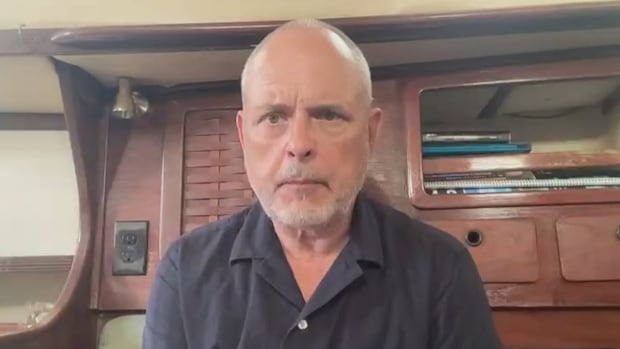British Columbia·Q&AStephen Maher has been a journalist for coming up on 40 years, and in that time he’s watched news and how it is reported shift — and not for the better, he says. ‘We’ve lost something important,’ Maher says of the closure, downsizing of many local news outletsCBC News · Posted: Oct 14, 2025 9:00 AM EDT | Last Updated: 2 hours agoJournalist Stephen Maher has seen a lot change during his career, and says that without journalism, society could become more and more polarized. (CBC News)Stephen Maher has been a journalist for coming up on 40 years, and in that time he’s watched news and how it’s reported shift — and not for the better, he says. “I spent many years covering politics from the gallery in the House of Commons, originally as a correspondent for the Halifax newspaper. At that time, you could see that Members of Parliament from across the country would raise issues to try to get stories in their local papers and affect change for their constituents,” he said. But now, many of those community papers and even TV and radio stations have closed — or at least shrunk down to a point where they can’t report nearly as much. “I think that a fundamentally important part of the machine of democratic accountability, we’ve lost one of the gears,” Maher said. This year’s Southam Lecturer at the University of Victoria, Maher shared his thoughts with a crowd in the province’s capital on Wednesday. But first, he spoke about the role reporters play in an increasingly fractured society with Gregor Craigie, host of CBC’s On The Island. LISTEN | Stephen Maher on journalism and polarization:On The Island11:34Taking a closer look at the role reporters play in polarized timesCBC’s Gregor Craigie spoke with Stephen Maher, a journalist, author, and UVic Southam lecturer.This interview has been edited for length and clarity.What are the consequences of closing down those local news outlets, both for communities and in the country as a whole?When I think of these towns where I worked in small town Newfoundland, the newspaper would let everyone know what’s going on. It was a space for debates and discussions, not always at the highest level. We weren’t doing cutting edge investigative journalism, but there was a record, a shared public space to discuss issues of importance to the area. So I think we’ve lost something important.One of the results of this is that people are getting a lot of information from algorithmic platforms, Facebook and Twitter and TikTok that are very narrowly focused to whatever it is that animates them as individuals. So we have lost the sense of a shared set of facts that a community agrees on and that seems to have contributed to greater political polarization. Polarization in itself is not necessarily bad, but selective polarization where people become hostile to those they disagree with, that’s worrying. And it leads to potentially political violence and a sense of deep unhappiness when the other party is running things. And those things are kind of disturbing. There are a lot of outside factors going on here, outside, I should say, of the mainstream media. But mainstream journalists need to look at our own role in all of this, too, don’t we?I believe that’s right. I think that the same process of polarization that has affected the broader society is also affecting us, and the vast majority of working journalists are in the group associated with the progressives, if you know what I mean. There are university people, often the journalism schools have become more influential over time. I think that increasingly, it’s not necessarily intuitive for journalists to report on the views of people outside that consensus. I think that the traditional part of the job is to reflect what’s happening, what you hear at Tim Horton’s, at the curling rink, and to bring the views of the public to light. And because of the loss of resources and the sort of polarization effect, I think that very often now, instead, journalists are sort of writing stories reflecting the views of the “academy” to the broader world.WATCH | What is the future of journalism?:Is there a future for journalism?Concordia University associate professor of journalism, Magda Konieczna, says being innovative and entrepreneurial will be key to producing journalism outside of the current corporate model.I started to think about this in Nova Scotia. I looked back in Nova Scotia now after the housing crisis got bad. We had encampments in some of the most beautiful and important parks and Halifax tent cities. And I noticed that almost all of the journalism about this seem to have a frame whereby the city was being kind of heartless and pushing people out and there were not stories about how people were frustrated that our nicest and most important parks were no longer really usable for the public.I was at a political event and talking to a strategist for a mayoral candidate about this. And she said to me, “have you seen the polling Canadians or people in Halifax want the encampments gone, there’s a strong public mood against this.” And I had not seen that in any stories.I’m not a heartless person. I don’t relish the idea of throwing homeless people out of the encampment. So it’s not like I have a particular position on this. But it started to seem to me like we’re not doing our jobs if we’re not reflecting the view from the street. We should be telling people about the views of the academy. But the other, another part of the job is to tell the academy what the street is saying.Are you optimistic that things can get better or does it feel we’re continuing in the same generally downward direction?Things could get worse. CBC is vitally important and the leader of the Opposition wants to basically get rid of it. So that I think would be disastrous. And that’s still possible.I would like to see the Conservatives change their policy. And I would like to see the CBC reflect on why it is that so many grassroots Conservatives feel they don’t hear themselves in it. But, you know, there’s still a lot of important good work being done every day. Some media organizations are healthy, the CBC is healthy, the Globe and Mail is healthy. The Toronto Star has its moments, and there are bright spots like the Narwhal and the Tyee and startups and so on.Even if things used to be better in a way, at least there’s still a lot of important journalism. Journalists have a unique ability to cast light in dark corners and reveal things and leads to social reforms. It’s a fantastic tradition and we should think about that a little bit, about how important it is.
What role does journalism play in polarized times? Journalist Stephen Maher breaks it down











